Classic Commentaries and Studies on Luke (24 vols.)
Digital Logos Edition
Overview
This massive twenty-five volume collection features some of the best commentaries and studies on the Gospel According to Luke from the late nineteenth and early twentieth centuries. With scholars and authors such as James Foote, Edwin W. Rice, Charles Erdman, Arthur Carr, and James Hamilton, Classic Commentaries and Studies on Luke (25 vols.) offers over 9,000 pages of interpretation, observations, translations, contextual history, and application on the "most literary" book of the New Testament. The twenty-four volumes contained in Classic Commentaries and Studies on Luke (25 vols.) have had an enduring impact on New Testament exegesis, and this exceptional collection provides easy accessibility to this wealth of significant scholarship.
This collection is essential for students, scholars, pastors, historians, teachers of the Bible, or anyone studying the Gospel According to Luke. With Logos Bible Software, this collection is completely searchable, with passages of Scripture appearing on mouse-over, as well as being linked to the Greek and Latin texts and English translations in your library. This makes these texts more powerful and easier to access than ever before for scholarly work or personal Bible study. With the advanced search features of Logos Bible Software, you can perform powerful searches by topic or Scripture reference—finding, for example, every mention of “John the Baptist,” or “Luke 15:11–32.”
Want more classic scholarship on the book of Luke? Check out Classic Commentaries and Studies on Luke Upgrade (22 vols.).
This title is included in the following collections
You can save when you purchase this product as part of a collection.
Logos 8 Collector's Edition Le...
$11,399.99$11,399.99Logos 9 Collector's Edition Le...
$11,399.99$11,399.99Logos 8 Ultimate Legacy Librar...
$21,749.99$21,749.99Logos 9 Ultimate Legacy Librar...
$24,999.99$24,999.99

- Over nine thousand pages dedicated to the Gospel of Luke
- Noted authors from a wide variety of backgrounds
- Completely searchable, linked to your preferred Bible translation and the other books in your library
- Title: Classic Commentaries and Studies on Luke
- Volumes: 24
- Pages: 9,169
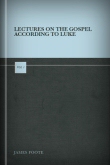
These lectures cover the entire book of Luke, in-depth, from the keen perspective of popular preacher and teacher James Foote. Volume one contains forty lectures and covers up to Luke 8:16–21.
It would be difficult to point to a work on the Gospel of Luke so ample in its details and illustrations, and, at the same time, so thoroughly to be relied on for its sound and orthodox views of Christian truth. Mr. Foote is one of those theologians who may be trusted, and who is altogether lifted above those follies and conceits which weaken and corrupt much of our modern expositions of Holy Scripture.
—Evangelical Magazine
Admirable specimens of the good old Scottish style of lecturing.
—English Presbyterian Messenger
James Foote was a Scotch clergyman and author of numerous books. Educated at Marischal College and the University of Aberdeen, Foote was ordained in 1809 and ministered at the Free East Church of Aberdeen. Foote's other works include A Treatise on Effectual Calling and A Sermon in the Free Church Pulpit.
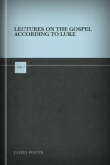
These lectures cover the entire book of Luke, in-depth, from the keen perspective of popular preacher and teacher James Foote. Volume two contains fifty lectures and covers up to Luke 17:11–19.
James Foote was a Scotch clergyman and author of numerous books. Educated at Marischal College and the University of Aberdeen, Foote was ordained in 1809 and ministered at the Free East Church of Aberdeen. Foote's other works include A Treatise on Effectual Calling and A Sermon in the Free Church Pulpit.
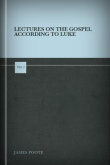
These lectures cover the entire book of Luke, in-depth, from the keen perspective of popular preacher and teacher James Foote. Volume three contains forty-seven lectures and covers up to Luke 24:50–53.
James Foote was a Scotch clergyman and author of numerous books. Educated at Marischal College and the University of Aberdeen, Foote was ordained in 1809 and ministered at the Free East Church of Aberdeen. Foote's other works include A Treatise on Effectual Calling and A Sermon in the Free Church Pulpit.
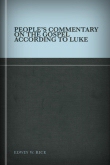
In writing this commentary on Luke, Rice had a couple of goals in mind: to place each reader of the Gospel narrative as if he/she were in Galilee or Judea, and familiar with the scenery, people, habits of life, speech and thought current in Palestine when Jesus was upon the earth; and to aid the reader in grasping the meaning of the text. This volume includes beautiful illustrations and artwork, maps, and engravings.
Edwin W. Rice graduated from Union Theological Seminary in 1857 and worked for the American Sunday School Union for over twenty years in various positions, such as missionary, superintendent of missions, and editor of periodicals. He is the author of numerous books, including The Origin of Sunday Schools, Religion in Art, and The Heavenly City.
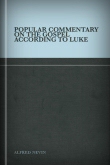
Filled with numerous drawings and maps, Alfred Nevin's commentary moves verse-by-verse through Luke and includes study questions at the end of each chapter.
To the biblical student it will be valuable as a book of reference on many points.
—Friends' Intelligencer
Alfred Nevin (1816–1890) graduated from Western Theological Seminary in Allegheny, Pennsylvania in 1839, and pastored at numerous churches in the same state. Among his numerous works is Triumph of Truth, Guide to the Oracles, and A Plea for Christian Union.
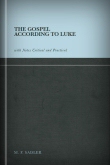
Before giving a verse-by-verse commentary on the Gospel of Luke, M. F. Sadler explores the authenticity of Luke, Luke found in the early Fathers, the medical language found in the Gospel of Luke, and more. Over six hundred packed pages of solid scholarship in this oft-cited classic commentary.
Mr. Sadler's commentary is decidedly one of the most unhackneyed and original of any we have. It will often be found to give help when others fail to do so.
—Guardian
It is far the best practical commentary that we know, being plain-spoken, fearless, and definite, and containing matter very unlike the mil and water which is often served up in so-called 'practical' commentaries. For solid Church teaching it stands unrivaled.
—Church Quarterly
This is a work of a veteran scholar and divine to whom the Church owes much.
—Church Bells
Michael Ferrebee Sadler (1819–1895) graduated from St. John's College, Cambridge in 1847. He was a gifted theologian and wrote numerous popular books, including The Sacrament of Responsibility, The Second Adam and the New Birth, The Communicant's Manual, and Church Doctrine, Bible Truth.
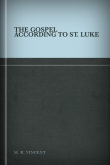
M. R. Vincent's concise commentary on Luke discusses the authenticity, the intended audience, the literary quality, internal characteristics of Luke, and more. Vincent also includes a list of English literature influenced or that references the Gospel of Luke, and a table that depicts a timeline of the first one hundred years after the death of Christ.
Marvin Richardson Vincent was a professor of New Testament Exegesis and Criticism at Union Theological Seminary. Vincent was the author of numerous books, including The Minister's Handbook, Critical Commentary on Philippians and Philemon, History of Textual Criticism of the New Testament and In the Shadow of the Pyrenees.
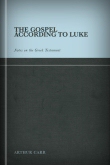
Arthur Carr aims to illustrate the history of the Greek language by Hellenistic usages, to determine the meaning of Greek words, especially those not found in classical writings, to explain Jewish customs to which reference is made, and to trace the train of the Evangelist's thoughts.
The most useful and scholarly commentary, in a short compass, on the Gospel of S. Luke, in Greek, that has hitherto appeared.
—Hour
Arthur Carr was a Fellow of Oriel College, Oxford and Assistant Master at Wellington College.
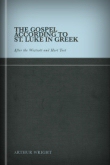
After a thorough introduction, Wright provides the text of Luke's Gospel in Greek parallel with examples and illustrations from the other Gospels.
A valuable contribution to the study of the Gospels. . . . A book which deserves and will well repay the attention of all students of the Gospels. . . . We can strongly recommend the book for its thoroughness, its sound scholarship, its great accuracy.
—Athenaeum
Arthur Wright (1870–1889) was Classical Lecturer and Vice President of Queens' College, Cambridge.
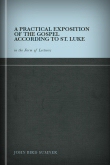
John Bird Sumner comprehensively examines the Gospel According to Luke in 141 lectures. Each chapter and verse of Luke is closely examined, and Sumner offers practical application for the everyday Christian.
It is impossible to read these expositions without becoming better acquainted both with the way of salvation and the duties and privileges of the Christian life.
—Christian Observer
John Bird Sumner (1780–1862) was bishop of the Church of England and Archbishop of Canterbury. He was the author of numerous books, including Treatise on the Records of Creation and the Moral Attributes of the Creator and The Evidence of Christianity Derived from its Nature and Reception.
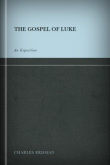
Charles Erdman moves verse-by-verse through the Gospel of Luke, offering helpful commentary on the text's meaning and connection to the other Gospels.
Coming from the pen of an experienced expositor this work is unusually helpful.
—Record of Christian Work
Charles Erdman (1866–1960) was an American Presbyterian minister and professor of theology at Princeton Theological Seminary.
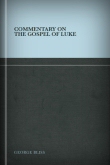
This commentary on Luke aims to aid the reader to understand the Gospel as one of its first readers would. Bliss provides notes on the translation and the needed historical, local, and archeological information required to understand Luke in context.
The notes are conservative, comprehensive, wise, edifying.
—The Examiner
A work that will not soon be equaled. It is every way excellent, classic in language, sound in exposition, luminous and wonderfully fresh. It is a feast to read it.
—Religious Herald
George Bliss was Professor of Biblical Literature at Crozer Theological Seminary in Upland, Pennsylvania.
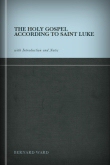
This thorough verse-by-verse commentary is preceded by an in-depth introduction where Bernard Ward discusses the life of St. Luke, the different versions of the text, the circumstances of its composition, the harmony with the other three Gospels, and more.
Bernard Ward (1857–1920) was President of St. Edmund's College, Cambridge.
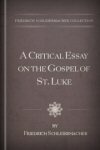
In A Critical Essay on the Gospel of St. Luke, German theologian Frederick Schleiermacher makes a critical inquiry into the origin of Luke's Gospel.
Frederick Schleiermacher (1768–1834) was one of the most influential and prominent German theologians of the 19th century. He authored dozens of books, including The Christian Faith, Christmas Eve: A Dialogue on the Incarnation, and On Religion: Speeches to its Cultured Despisers.
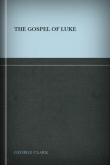
Designed for preachers and teachers, George Clark's commentary on the Gospel of Luke includes maps, illustrations, tables depicting a synoptical view of the Gospels, and more. Clark ends each chapter with summary remarks and suggestions for further study.
George W. Clark was author of The Harp of Freedom, A New Harmony of the Four Gospels, The Mighty Worker: Lessons in Mark, and Brief Notes on the New Testament: The Gospels.
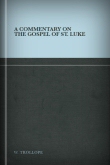
W. Trollope provides extensive notes on the Greek text of Luke, as well as "examination" questions at the bottom of each page. These questions, provided throughout the entire introduction as well, work as helpful study aids throughout this useful commentary.
William Trollope (1798–1863) was a Classics Master at Pembroke College, Cambridge and author of the two-volume Analecta Theologica.
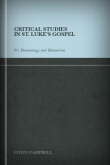
Colin Campbell's thesis points to two distinct features found in the Gospel of Luke that differentiate it from Matthew and Mark: the deliberate focus of the author on demonology and Ebionitism. An interesting reading of the Gospel of Luke, Campbell provides an index of the demonology found in the third Gospel and an index for its Ebionite tendencies.
...bright and scholarly, it is also painstaking, thorough, and rich in suggestions. Scholars will welcome it and peruse it with pleasure.
—Scottish Review
Mr. Campbell's Critical Studies in St. Luke's Gospel: Its Demonology and Ebionitism is a very different kind of work from the commonplace studies and commentaries which are common enough. It is decidedly original.
—Westminster Review
Colin Campbell was minister of the Parish of Dundee and gained the Black Theological Fellowship from Glasgow University. Campbell was the author of the book The First Three Gospels in Greek and numerous articles on Shakespeare and Chaucer.
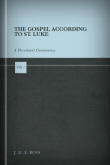
In view of the devotional and practical purpose of this three-volume commentary on Luke, very little is given to critical questions. With these volumes, Ross hopes to "elicit its value for faith and love. It is hoped that this commentary may in some measure kindle worship at the fire of the worship which is in the Gospel, and help to reveal the thing which in this beautiful Book is most beautiful—the Grace of the Lord Jesus Christ." Volume one includes forty-four essays and covers up to Luke 11:37–54.
J. M. E. Ross is the author of numerous books, including The First Epistle of Pater: A Devotional Commentary, The Christian Standpoint, The Christian Brotherhood, and Lord, Teach Us to Pray: Sermons on Prayer.
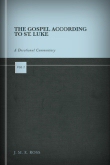
In view of the devotional and practical purpose of this three-volume commentary on Luke, very little is given to critical questions. With these volumes, Ross hopes to "elicit its value for faith and love. It is hoped that this commentary may in some measure kindle worship at the fire of the worship which is in the Gospel, and help to reveal the thing which in this beautiful Book is most beautiful—the Grace of the Lord Jesus Christ." Volume two includes twenty-six essays and covers up to Luke 18:1–8.
J. M. E. Ross is the author of numerous books, including The First Epistle of Pater: A Devotional Commentary, The Christian Standpoint, The Christian Brotherhood, and Lord, Teach Us to Pray: Sermons on Prayer.
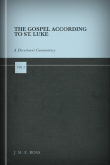
In view of the devotional and practical purpose of this three-volume commentary on Luke, very little is given to critical questions. With these volumes, Ross hopes to "elicit its value for faith and love. It is hoped that this commentary may in some measure kindle worship at the fire of the worship which is in the Gospel, and help to reveal the thing which in this beautiful Book is most beautiful—the Grace of the Lord Jesus Christ." Volume three includes twenty-nine essays and covers up to Luke 24:36–53.
J. M. E. Ross is the author of numerous books, including The First Epistle of Pater: A Devotional Commentary, The Christian Standpoint, The Christian Brotherhood, and Lord, Teach Us to Pray: Sermons on Prayer.
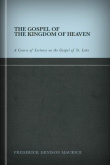
Frederick Denison Maurice revised his most popular sermons on the Gospel According to Luke and set about putting them into book form. This volume contains twenty-eight lectures.
Deep earnestness and spiritual fervor may be expected in everything that comes from Mr. Maurice's pen, and no one who looks in the Lectures on Luke for these qualities need fear to be disappointed.
—Theological Review
Frederick Denison Maurice (1805–1872) was born at Normanston, Suffolk, and after obtaining a civil law degree and pursuing a career in the literary field, decided to seek Anglican ordination. In 1834 he was ordained and was appointed as Chaplain of Guy's Hospital. He authored numerous popular books, including The Kingdom of Christ, Moral and Metaphysical Philosophy, The Prophets and Kings of the Old Testament, and The Lord's Prayer, a Manual.
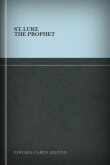
"A belief in Christianity must ever be a belief in its power to save and renew and uplift the soul of a man, and not merely a historical knowledge of the fact that it once possessed this power," writes Selwyn in the preface. St. Luke the Prophet examines the Gospel According to Luke in context with the rest of the New Testament
No one can read this treatise without learning very much from it.
—Spectator
Edward Carus Selwyn (1853–1913) was Headmaster of Uppingham School and a Fellow of King's College, Cambridge. He was the author of The Christian Prophets and The Oracles in the New Testament.
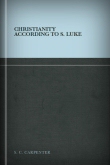
This volume grew out of a series of lectures S. C. Carpenter delivered at Cambridge in 1915. Substantially revised and enlarged, these essays explore the life and the Gospel of Luke.
Spencer Cecil Carpenter (1877–1959) was an Anglican priest and author. A Professor of Theology at Queen's College and Dean of Exeter in the Church of England for ten years, Carpenter also authored numerous works, including The Church and Politics, Faith in Time of War, and Eighteenth Century Church and People.
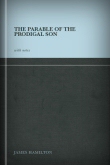
Beautifully illustrated and richly articulated, James Hamilton reinterprets the Parable of the Prodigal Son into various modern contexts.
The volume presents a richly "pictured page," both from the eloquence of the writer and the hand of the artist.
—Methodist Review
Dr. Hamilton's "Notes," or rather lectures, are, like all his productions, eloquent and impressive.
—The Baptist Quarterly
James Hamilton (1814–1871) was born in Paisley, Scotland and was pastor of the National Scotch Church, Regent Square London. He served as the editor for Presbyterian Messenger and Evangelical Christendom, and authored numerous popular books, including Life in Earnest, The Mount of Olives, The Royal Preacher, and the four-volume Our Christian Classics.
Reviews
7 ratings
John Broom
1/18/2020

M. David Johnson
3/27/2015

Larry Proffitt (I
11/13/2013

Caleb Allen
10/12/2013
Eduardo Vega
9/25/2013

Faithlife User
7/26/2013

Gary Butner, Th.D.
7/16/2013